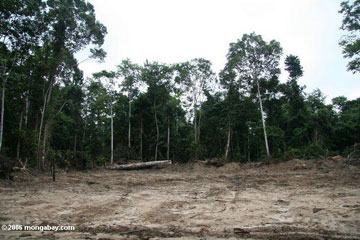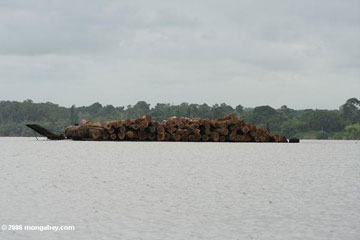Fighting illegal logging to be a top G8 priority in 2008
Fighting illegal logging to be a top G8 priority in 2008
mongabay.com
March 5, 2008
As president of the G8, Japan puts focus on sustainable forest management and timber certification
|
|
As it assumes the chair of the G8, Japan will make sustainable forest management a top priority, said a top Japanese government official.
“While promoting ‘sustainable forest management’, we need to try to halt deforestation and forest degradation,” said Prime Minister Yasuo Fukuda speaking last month at a Climate Change Forum in Brasilia, Brazil. “I intend to promote a discussion on forest-related issues with the countries concerned in order to make important progress towards their resolution.”
Fukuda said Japan would reduce its own greenhouse gas emissions while working to help developing countries address environmental issues through a $10 billion initiative called the “Cool Earth Promotion Program.”
In line with Fukuda’s remarks, the forum produced a proposal on reducing illegal logging. The scheme calls for a global certification and tracking system for timber as well as financial assistance for countries to develop and implement “credible, certified sustainable forest management.”
The text of the proposal appears below.
G8 Illegal Logging Dialogue Policy Proposal to Japanese G8 Summit
Submission from the GLOBE Brasilia G8+5 Legislators Forum
1. Legislative Measures:

|
1.1 Introduction of a Global System for Recognizing Source Countries Licensing Schemes
We propose that there should be a global system for recognizing and enforcing the license schemes for legal timber, encompassing all major timber source and consumer countries. To achieve this, we believe that the following steps are necessary:
We consider that G8 countries should take the lead in establishing the legality of their own timber exports.
1.2 Introduction of Domestic Legislation within G8
We propose that consumer countries should reinforce the legislation passed by producer countries. We believe that excluding illegal timber products from consumer markets has a critical role to play as one of a range of measures directed against illegal logging. We therefore propose:
2. Markets for Legal and Sustainable Timber
We believe that building protected markets for legal and sustainable timber products has an important part to play as one of a range of measures directed against illegal logging. We believe that this would have the effect of raising the market price for legal and sustainable timber. We propose the following market-orientated steps:
3. Governance — Forest Sector Transparency
We recommend that the G8 support the introduction of a global Forest Transparency Initiative (FTI). This should be developed with International Finance Institutions and pilot tested at a country level in Asia and Central and West Africa. This should be designed to establish parliamentary oversight through committees in producer and consumer countries and make available robust and relevant financial information that can improve accountability and governance of national forest resources.
We believe that for the FTI to succeed that there should be a requirement for public and private bodies to participate in/comply with the requirements of an FTI.
Finance for sustainable forest management
We believe that the costs of achieving credible, independently verified standards of sustainable forest management are relatively very high. Illegal logging depresses market values of timber product, weakening the competitiveness of sustainable timber product in a largely undiscerning market. There are significant inherent risks to investing in tropical developing countries. It is clear, therefore, that there are significant barriers to the flow of investment capital into tropical forestry sector projects. We therefore propose the following steps are taken to stimulate allocation of investment capital to the tropical forestry sector and assist in the transition of progressive timber companies to forest management companies:
- Capacity building
- appropriate forest management enterprises to implement credible, certified sustainable forest management activities.
- development of sustainable value-adding’ timber processing capacity within the producer country rather than simply exporting raw timber.
- the transition of existing sustainable forest management operations from principally timber producers to multiple-revenue (goods- and services-based) forest management operations.
